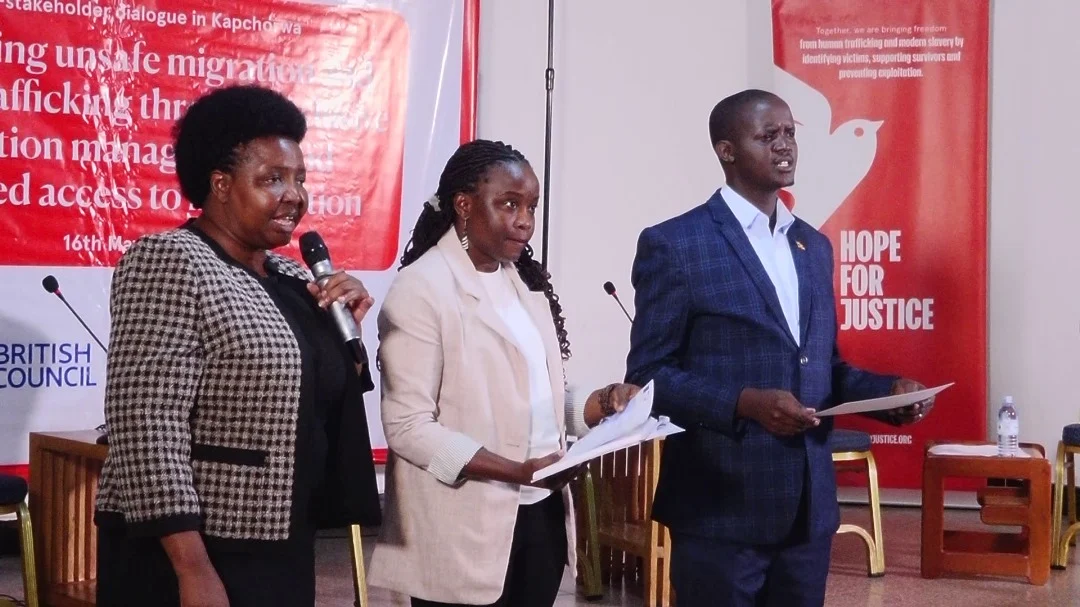Hope for Justice Leads Push in Kapchorwa Against Unsafe Migration and Trafficking

As Uganda continues to record rising cases of human trafficking and unsafe migration, the anti-trafficking organisation Hope for Justice has rallied local and national stakeholders in Kapchorwa District to build stronger grassroots interventions.
The dialogue, held under the theme, “Identifying Victims, Supporting Survivors, and Preventing Exploitation through Collaboration with Government,” aimed to foster community-based strategies to combat the growing threat of exploitation.
The high-level engagement was part of the Better Migration Management (BMM) programme, implemented in partnership with the British Council and funded by the European Union and German Cooperation.
It brought together government officials, civil society organisations, spiritual leaders, youth activists, and local administrators from across the Sebei sub-region.
Uganda remains both a source and a transit country for human trafficking. According to the Ministry of Internal Affairs, at least 1,295 Ugandans were identified as victims of trafficking in 2023.
A significant proportion were women and girls, lured by fraudulent job offers and trafficked for labour and sexual exploitation, especially in the Middle East.
Hope for Justice Country Director Florence Soyekwo underscored the need for community-centred solutions.
“We are here to shine a spotlight on unsafe migration and human trafficking. Our strategy is rooted in empowerment, inclusion, and dialogue. When communities understand their rights and the risks, they become the first line of defence,” she said.
Kapchorwa Deputy Resident District Commissioner, Martin Sekaja, acknowledged the region’s particular vulnerability due to economic hardship and misinformation.
He pointed to unlicensed recruitment agents who exploit desperate individuals, particularly young women, by offering false employment promises.
“We’re seeing cases of forced migration and deceptive practices. Many leave hoping for a better life, only to end up trapped in exploitative conditions,” he said.
Sekaja also credited government campaigns against Female Genital Mutilation (FGM) for reducing a related form of migration—young girls fleeing circumcision.
However, he noted that other drivers of unsafe migration persist.
From the Ministry of Internal Affairs, Senior Data Analyst Roland Musingwire warned that many prospective migrants fail to distinguish between registered companies and those licensed to export labour.
“It could be registered with the Uganda Registration Services Bureau (URSB) but not licensed by the Ministry of Gender to carry out labour externalisation,” he said, urging would-be migrants to verify documentation before engaging any agent.
Despite existing frameworks, local governments still struggle to enforce labour recruitment regulations. Sam Bateman, Principal Labour Officer in Kapchorwa Municipality, admitted to systemic challenges.
“You just hear that people have left the country, but you don’t even know how they went or what they’re going through. Follow-up becomes a challenge,” he said.
The dialogue also highlighted the role of youth in promoting safe migration. Alison Calvin, a youth representative with the Active Citizens initiative, called for peer-led awareness campaigns.
“We have to raise awareness among our peers. Migration can be an opportunity—but only if it’s done right,” she said.
Hope for Justice has already begun addressing information gaps by establishing a local office in Kapchorwa to guide residents on safe migration procedures.
Community Programme Manager Madina Cakyama said the office works through local platforms to provide direct support and reporting channels.
Faith leaders also weighed in on the moral dimension of the crisis.
Charles Muduli, a spiritual leader and member of the Kapchorwa migration platform, urged leaders to take responsibility for protecting vulnerable members of the community.
“We must speak up, we must act, and we must restore values that protect our children from manipulation and trafficking,” he said.
As migration trends grow more complex, such localised dialogues are becoming a cornerstone of Uganda’s broader national response.
Participants pledged to strengthen coordination and invest in youth-led, decentralised strategies to stem the tide of unsafe migration and trafficking.



0 Comments